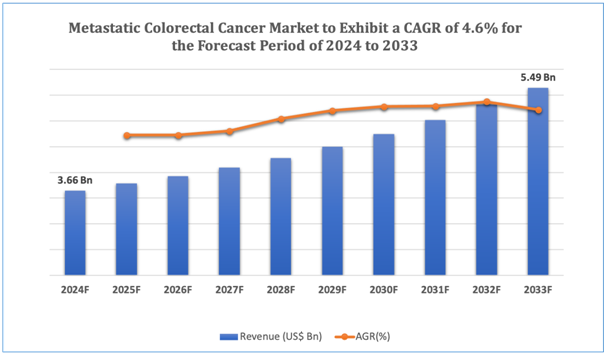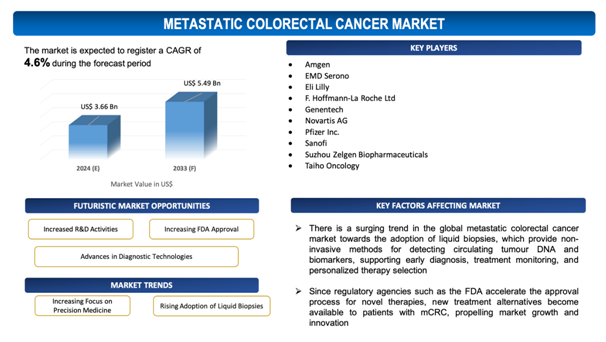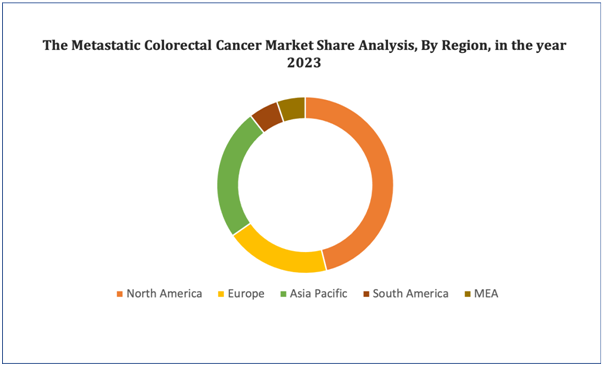Metastatic Colorectal Cancer Market Overview
The global Metastatic Colorectal Cancer market is estimated to be worth over USD 5.49Bn in 2033 and is expected to grow at CAGR of 4.6% during the forecast period (2024-2033). Metastatic colorectal cancer (mCRC) represents a substantial global health challenge, marked by the spread of cancerous cells from the colon or rectum to distant organs or tissues. Notwithstanding with the advancements in screening and treatment, mCRC remains a primary cause of cancer-associated mortality across the world. The disease strain is influenced by varied factors, comprising age, genetic predisposition, lifestyle factors such as physical activity and diet, and the presence of underlying conditions such as inflammatory bowel disease. The global market for mCRC surrounds a scale of diagnostic, therapeutic, and supportive care interventions focused at enhancing patient outcomes. Diagnostic tools comprise imaging techniques such as magnetic resonance imaging (MRI), computed tomography (CT) scans, and colonoscopies, as well as molecular biomarkers that aid in guiding treatment decisions and predict prognosis. Therapeutically, treatment alternatives for mCRC have expanded at a significant pace in the past few years, comprising surgery, chemotherapy, targeted therapy, and immunotherapy. Novel treatments such as immune checkpoint inhibitors and molecularly targeted agents offer new horizons for patients with refractory disease or specific genetic mutations. Supportive care interventions, involving pain management, nutritional support, and psychosocial services, hold a critical role in addressing the physical and emotional needs of patients with mCRC. Despite these advancements, challenges persist, including limited treatment efficacy in advanced disease stages, high treatment costs, and access barriers in underserved regions. In addition to that, the emergence of resistance mechanisms to targeted therapies underscores the need for ongoing research and development efforts to identify new therapeutic targets and combination strategies. Nonetheless, collaborations between healthcare providers, researchers, pharmaceutical companies, and patient advocacy groups drive progress in addressing the unmet needs of patients affected by mCRC. Overall, the global market for mCRC is evolving swiftly, with advancements in technology and therapeutic approaches offering hope for improved outcomes and quality of life for patients combating this complicated disease.
Figure 1. Metastatic Colorectal Cancer: Market Size

Get more details on this report - Request Free Sample
Key Market Insights &Current Market Landscape:
The global market landscape for metastatic colorectal cancer (mCRC) is marked by multiple key market insights and notable developments. Incidence rates of mCRC differ across regions, with factors such as genetic predisposition, age, and lifestyle contributing to disease strain. Significant developments involveinnovations in diagnostic technologies, such as molecular biomarkers and imaging modalities, supporting early detection and personalized treatment selection. Therapeutically, treatment alternatives have expanded substantially, with chemotherapy, surgery, targeted therapy, and immunotherapy including the standard of care. Significant advancements include the introduction of immune checkpoint inhibitors and molecularly targeted agents, offering new treatment avenues for patients with refractory disease or specific genetic mutations. Additionally, supportive care interventions play a crucial role in addressing patients' physical and emotional needs throughout their treatment journey. In spite of these advancements, challenges persist, including limited treatment efficiency in advanced disease stages, higher treatment costs, and access barriers in underserved regions. Nonetheless, collaborations between healthcare providers, researchers, pharmaceutical firms, and patient advocacy groups fuel progress in addressing the unmet needs of patients affected by mCRC, promoting innovation and enhancing patient outcomes in this complex disease outlook.
Market Dynamics
Market Drivers
Increasing FDA Approval for Metastatic Colorectal Cancer Treatment
Since regulatory agencies such as the FDA accelerate the approval process for novel therapies, new treatment alternatives become available to patients with mCRC, propelling market growth and innovation. For instance, in January 2023, Tucatinib (Tukysa, Seagen Inc.) and trastuzumab received accelerated approval from the Food and Drug Administration for the treatment of RAS wild-type HER2-positive metastatic or unresectable colorectal cancer that has progressed after receiving fluoropyrimidine, oxaliplatin, and irinotecan-based chemotherapy. An open-label, multicenter experiment called MOUNTAINEER (NCT03043313) examined effectiveness in 84 patients. FDA approvals offer healthcare providers with additional tools to effectively administer mCRC, addressing the various needs of patients with different disease characteristics and treatment histories. In addition to that, the approval of new therapies often encourages competition among pharmaceutical companies, leading to increased investment in research and development efforts aimed at developing firms efficacious and tolerable treatments. Along with that, FDA approvals for combination therapies and targeted agents provide opportunities for personalized treatment approaches customized to individual patient profiles, further fueling market expansion. Overall, the increasing FDA approval for mCRC treatments not only broadens the treatment armamentarium but also fosters advancements in precision medicine and improves patient results in the evolving landscape of the global mCRC market.
Market Restraints
With regard to numerous advantages of Metastatic Colorectal Cancer, the market faces several challenges due to the unique characteristics and requirements associated with them. Some of the key market challenges include:
- Treatment Resistance: Resistance to existing treatments, comprising chemotherapy and targeted therapies, presents a significant challenge in the management of metastatic colorectal cancer (mCRC), confiningtreatment alternatives and affecting patient outcomes.
- High Treatment Costs: The high costs associated with mCRC treatments, comprising chemotherapy, targeted therapy, and immunotherapy, present financial barriers to access for patients and healthcare systems, hindering market growth and limiting treatment accessibility.
Market Opportunities
Increased R&D Activities
As the understanding of the molecular pathways and mechanisms underlying mCRC continues to evolve, there is a soaring focus on developing novel therapeutic approaches and precision medicine strategies. Pharmaceutical companies, academic institutions, and research organizations are investing heavily in R&D efforts aimed at discovering and developing innovative treatments, including targeted therapies, immunotherapies, and combination regimens. In addition to that, innovations in diagnostic technologies, biomarker identification, and predictive modeling improve early detection, patient stratification, and treatment selection, fueling personalized medicine approaches in mCRC management. Collaborative research initiatives, clinical trials, and translational research programs further contribute to diversifying the treatment armamentarium and enhancing patient outcomes. Along with that, regulatory incentives, expedited approval pathways, and market exclusivity provisions for breakthrough therapies incentivize investment in mCRC R&D, nurturingadvancements and competition in the market. Overall, growing R&D activities hold commitment for addressing the unmet medical needs of patients with mCRC, fueling progress and advancements in treatment options, and ultimately defining the future panorama of the global mCRC market.
Market Trends
- Rising Adoption of Liquid Biopsies: There is a surging trend in the global metastatic colorectal cancer market towards the adoption of liquid biopsies, which provide non-invasive methods for detecting circulating tumor DNA and biomarkers, supporting early diagnosis, treatment monitoring, and personalized therapy selection.

Get more details on this report - Request Free Sample
Metastatic Colorectal Cancer Market: Key Segments
By Treatment
- Chemotherapy
- Targeted Therapies
- Immunotherapies
- Monotherapy and Combination Therapy
- Others
By Drug class
- Anti-EGFR (Epidermal Growth Factor Receptor) Inhibitors
- Anti-VEGF (Vascular Endothelial Growth Factor) Therapies
- Anti-HER2 (Human Epidermal Growth Factor Receptor 2) Therapies
- Immune Checkpoint Inhibitors
- Others
By End-user
- Hospitals
- Cancer Centers
- Ambulatory Surgical Centers
- Others
By Key Geographical Regions
- North America
- Europe
- Asia-Pacific
- Middle East and Africa
- South America
Metastatic Colorectal Cancer Market: Regional Analysis
North America is estimated to hold a significant share of the total market share in 2023. In September 2022, for patients with metastatic colon cancer for whom traditional therapy is no longer effective, a new phase 2 clinical trial directed by Robert Lentz, MD, a member of the University of Colorado Cancer Centre, may provide hope. In the United States, colorectal cancer is the third most prevalent and third most lethal cancer in both men and women. Furthermore, there are not many viable therapeutic alternatives available once chemotherapy and biological therapy cease to be successful in patients.
Figure 4. Metastatic Colorectal Cancer Market: Distribution by Region

Get more details on this report - Request Free Sample
Leading Metastatic Colorectal Cancer Developers
Industry Trends and Global Forecasts, 2023-2035 report features an extensive study of the current market landscape, market size and future opportunities associated with the Metastatic Colorectal Cancermarket, during the given forecast period. Further, the market report highlights the efforts of several stakeholders engaged in this rapidly emerging segment of the biopharmaceutical industry. Key takeaways of the Metastatic Colorectal Cancermarket are briefly discussed below.
The report includes the list of players operating in the global Metastatic Colorectal Cancermarket. Some of the key players include:
- Amgen
- EMD Serono
- Eli Lilly
- F. Hoffmann-La Roche Ltd
- Genentech
- Novartis AG
- Pfizer Inc.
- Sanofi
- Suzhou Zelgen Biopharmaceuticals
- Taiho Oncology
Recent Developments in the Metastatic Colorectal Cancer Market
Several recent developments have taken place in the field of Metastatic Colorectal Cancer, some of which have been outlined below. These developments, even if they took place post the release of our market report, substantiate the overall market trends that we’ve outlined in our analysis chronologically.
- In August 2023, Taiho Oncology, Inc. and Taiho Pharmaceutical Co., Ltd. reported that the U.S. Food and Drug Administration approved LONSURF (trifluridine/tipiracil) as a single agent or in combination with bevacizumab for the therapy of adult patients with metastatic colorectal cancer previously treated with fluoropyrimidine-, oxaliplatin-, and irinotecan-based chemotherapy, an anti-VEGF biological therapy, and if RAS wild-type, an anti-EGFR therapy.
Scope of the Report
The market report presents an in-depth analysis of the various firms / organizations that are engaged in this market, across different segments, as defined in the below table:
|
Key Report Attributes |
Details |
|
Base Year |
2023 |
|
Forecast Period |
2024-2033 |
|
CAGR (2024-2033) |
4.6% |
|
Treatment |
|
|
Drug Class |
|
|
End User |
|
|
Key Geographical Regions |
|
|
Key Companies Profiled |
|
